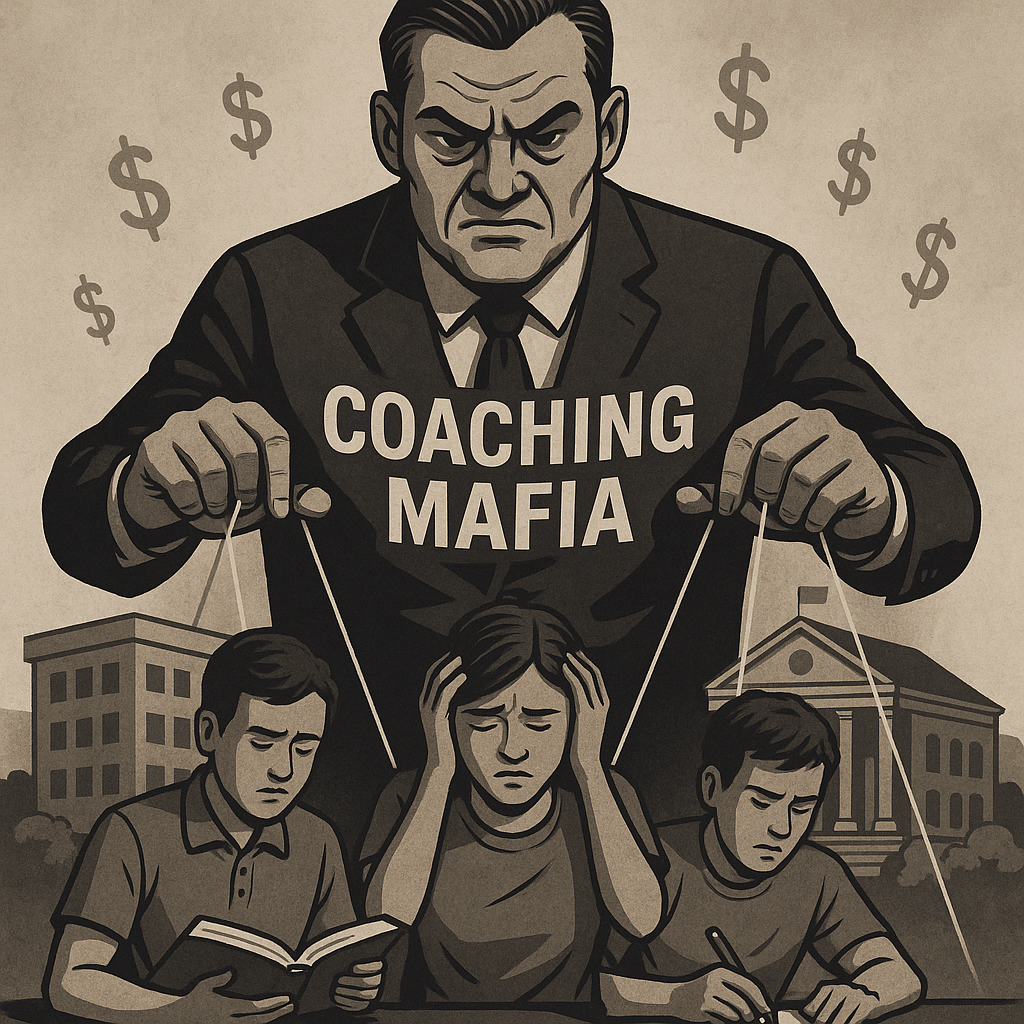In recent years, a concerning trend has emerged in India’s education system, especially in competitive exams like NEET, UPSC etc. The growing influence of coaching mafias has not only altered the pattern of these exams but has also deeply affected the mindset of students, parents, and the overall academic culture.

This article focuses specifically on the issue of tough NEET papers and why coaching mafias are strongly opposed to them. There is evidence, both anecdotal and structural, suggesting that these powerful coaching networks have indirect yet considerable influence over paper-setting bodies. While the full extent of this connection deserves a separate, in-depth discussion, the effect of their pressure is clear: NEET papers have become increasingly predictable and easy over the years, particularly since the 1990s.
Originally, NEET and other entrance exams were intended to test a student’s deep understanding, analytical skills, and mastery over fundamental concepts. However, with the rise of commercial coaching centers, the exam pattern has shifted toward a model that favors rote learning, shortcut techniques, and trend-based question prediction. These changes serve the interests of coaching centers, as they align perfectly with their teaching methods and allow them to claim credit for student success.
As a result, the nature of learning in India has changed drastically. Students no longer aim to master subjects or understand them in depth. Instead, they focus on cracking entrance exams through formulas, tricks, and mock tests. Parents, influenced by high success rates advertised by coaching institutes, push their children into these programs from an early age. The idea of education as a tool for personal and intellectual growth has been replaced by a narrow goal: securing a high-paying job.
Before the 1990s, education was viewed as a path to excellence. People studied to become true experts in their fields. Today, that passion has been largely replaced by a pragmatic, but shallow, approach to learning. Coaching centres have become the primary drivers of this change. By promoting exam-focused learning over concept-focused education, they have effectively poisoned the system.
Tough NEET papers, if implemented properly, can begin to reverse this trend. They would reward genuine understanding, problem-solving ability, and independent thinking — qualities that should define future doctors and scientists. But such a shift threatens the coaching industry’s business model, so they resist it so strongly.
THE TIME HAS COME TO CRITICALLY EXAMINE THE ROLE OF COACHING MAFIAS IN SHAPING INDIA’S EDUCATIONAL LANDSCAPE. IF WE WANT A SYSTEM THAT VALUES REAL KNOWLEDGE OVER MECHANICAL SUCCESS, WE MUST BEGIN BY RECLAIMING THE INTEGRITY OF OUR EXAMS.
NEET EXAM

The NEET (National Eligibility cum Entrance Test) paper in recent years has often been perceived as “easier” than in the past — especially by coaching institutes and well-prepared students. Here are several reasons why this might be happening:
1. Focus on NCERT Syllabus
- NEET has strictly aligned itself with the NCERT curriculum (especially for Biology).
- The questions are now more direct, and most can be answered if students are thorough with NCERT textbooks.
- This has reduced the complexity of trick questions or out-of-syllabus surprises.
2. Standardization and Fairness
- The NTA (National Testing Agency) aims to ensure fairness for students across all boards (CBSE, state boards).
- To avoid giving CBSE students an advantage, the paper is designed to be uniform and concept-based, not overly analytical or coaching-focused.
3. High Competition = High Cutoffs
- An “easy” paper does not mean an easier exam overall — it means:
- More students score high marks
- Cutoffs become very high (often above 600+ for good colleges)
- This puts more pressure on accuracy and speed, not just knowledge.
4. Post-COVID Pattern Stabilization
- After disruptions due to COVID, exam patterns stabilized, with fewer experimental questions or tough surprises.
- Authorities may have made papers less stressful due to earlier batch disruptions.
5. Influence of Coaching Industry
- Top coaching institutes predict patterns very accurately now.
- Many students report that “direct questions” came from mock tests or previous year trends, giving the impression that the paper is easy.
OVERVIEW: NEET 2025 PHYSICS PAPER ANALYSIS
The 2025 NEET Physics paper was described as moderately difficult, with a mix of numerical and conceptual questions. Many questions were based on NCERT, but some required more in-depth understanding and problem-solving skills, particularly for numerical and assertion-reason types. Time management was also challenging for some students, especially with lengthy calculations.
Difficulty Level: Moderately Difficult
- While many questions were NCERT-based, several required multi-step calculations, unit conversions, or deeper conceptual clarity.
- Numerical problems in topics like Electrodynamics, Modern Physics, and Thermodynamics were time-consuming.
- Assertion-Reason questions tested logical thinking, not just memorization.
Key Characteristics:
| Aspect | Observation |
| Numerical Questions | Often involved more than one formula; needed quick algebra skills. |
| Conceptual Questions | Some tested tricky edge-case reasoning (e.g., in Optics or Semiconductors). |
| Assertion-Reason | A few were ambiguous, demanding deep understanding of theory. |
| Time Management | Challenging due to the length of numericals and need for precision. |
Topic-Wise Highlights (Expected Weightage)
| Topic | Notable Trend |
| Mechanics | Balanced mix of conceptual and calculative questions. |
| Electrodynamics | Heavy numerical load, some based on tricky capacitor circuits. |
| Modern Physics | Assertion-Reason style + formula-based direct questions. |
| Thermodynamics | Lengthy problems with P-V diagrams and efficiency calculations. |
| Waves & Optics | Conceptually challenging (especially interference and Doppler). |
Time Management Tips (In Retrospect):
- Students who rushed through Biology first had better time for Physics.
- Skipping multi-step questions on first pass helped maximize accuracy.
Expert Tip: Even though questions are NCERT-aligned, NEET Physics is not just about reading — it requires daily practice with numericals, mock tests, and quick conceptual recall.
COACHING MAFIAS HATES TOUGH PAPERS
The so-called “coaching institutes” (large coaching institutes and their commercial networks) may prefer predictable or easier papers, and often dislike very tough or unpredictable ones.
1. Easier Papers Make Them Look More Successful
- Coaching centers design their materials around repeated trends and predictable patterns.
- When the NEET paper follows that trend, many students from those centers score well — boosting the coaching brand’s success rate.
- Tough papers reduce this “predictability” and expose gaps in rote-based preparation, which hurts their marketing claims.
2. Tough Papers Hurt Their “Topper Factory” Model
- Coaching businesses depend on producing toppers every year.
- When a paper is difficult or “unusual”:
- Even top students may underperform.
- It’s harder to show off ranks and AIRs (All India Ranks).
- This threatens their “guaranteed result” image, which is central to their business model.
3. Difficult Papers Shift the Focus to Real Learning
- Tough papers reward conceptual depth and independent thinking — not just repeated mock tests.
- This undermines the “spoon-fed” coaching model, where students follow pre-set tricks and shortcuts.
- Self-learners and rural candidates often perform better in such exams — which levels the playing field and challenges coaching dominance.
4. They Push for Predictable “Coachable” Papers
- Coaching institutes often lobby or influence patterns subtly, pushing for papers that are:
- More NCERT-aligned
- Contain repeatable question types
- Are objective and speed-based, rather than deeply analytical
Summary:
Coaching systems are optimized for predictability, volume, and profit — not for deep intellectual training.
Tough papers challenge that model and empower sincere, self-motivated students, which threatens the dominance of big coaching brands.

